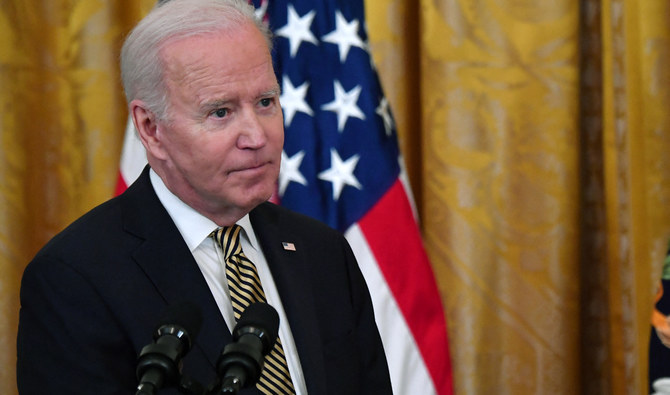
- ARAB NEWS
- 18 Jul 2025

As the veteran Lebanese journalist and Asharq Al Awsat columnist Eyad Abu Chakra tweeted on Monday: “The worst politico-military scenario is to be threatened by Russia, and promised protection by America!” I could not agree more: It was a brilliant and concise summary of the state of the world today.
What I can add, however, is that if the author Toby Young ever chose to write a sequel to his 2001 memoir “How to Lose Friends & Alienate People,” he would find a rich vein of content in US President Joe Biden’s foreign policy.
Just look at the headlines from the past few weeks alone — starting with Israel, the closest of US allies in the Middle East. Expressing shock at how far the ill-advised US negotiators in Vienna seem prepared to go in bowing to Iran’s demands, Israeli Prime Minister Naftali Bennett and Foreign Minister Yair Lapid said they “refuse to believe” that the US would remFwove the designation of the Islamic Revolutionary Guard Corps as a terrorist organization.
How rare it is to have Israel’s two most senior ministers fighting for Arab concerns (as well as their own) by reminding Team Biden that the IRGC’s malign tentacles extend throughout the Middle East, and that they bear responsibility for attacks on American civilians and American forces in the region
Of course, no sane person wants to see a nuclear Iran, and the world should do all it can to obtain a tougher, tighter deal. However, declassifying the IRGC simply to obtain a new agreement would be the equivalent of trying to put out a fire by spraying it with aviation fuel.
At the heart of the Biden administration’s zeal for the deal in Vienna is a personal vendetta against his predecessor, Donald Trump. That vendetta, along with internal political squabbling, also led to the delisting of the Tehran-backed Houthi militia as a terrorist group in early 2021 — reversing the Trump administration’s laudable action before he left office. In response, the Houthis, who overthrew Yemen’s internationally recognized government in 2014, have ramped up their deliberate targeting of civilian facilities in Saudi Arabia and the UAE. Instead of reconsidering its position, the Biden administration doubled down on its apparent strategy of alienating friends.
Saudi Arabia was absolutely right to say that it was not responsible for any oil supply shortage that results from attacks by the Iran-backed Houthi terrorist militias
Faisal J. Abbas
The US has not even taken the minimum, zero-cost decision to re-list the Houthis as a terrorist group, despite their blatant attacks at the weekend on Aramco facilities in Saudi Arabia at a time when global energy supplies are already being disrupted and accompanying price increases are troubling the world. Saudi Arabia was therefore absolutely right to say, as it did on Monday, that it could not be held responsible for any oil supply issues resulting from these Houthi attacks.
Indeed, from Toronto to Tokyo, truck drivers, airlines, cargo ships, hospitals and almost every other industry and individual affected by Biden’s ill-advised foreign policy should remember that the economic pinch they feel is on him.
But put aside Saudi Arabia, forget Afghanistan, ignore Israel. The biggest demonstration of US misjudgment is evident in Ukraine. President Volodomyr Zelenksy had to plead with the US Congress for more help, after Ukraine’s eternal hope of joining NATO was dashed, and a disrespected Obama-era red line on the annexation of Crimea set a dangerous precedent that paved the way to what is happening today.
From Toronto to Tokyo, every industry and individual affected by Biden’s ill-advised foreign policy should remember that the economic pinch they feel is on him.
Faisal J. Abbas
If long-time friends and allies in Saudi Arabia, the UAE, Israel and Ukraine are not enough to persuade Biden, or if he thinks the opinion of a Saudi newspaper editor will necessarily be biased against him, perhaps his team should look closer to home — and read a recent editorial in the Wall Street Journal that condemned his foreign policy direction in eloquent terms. “In this new era of Great Power competition, the US can’t afford to alienate allies that can help deter authoritarian aggressors bent on harming US interests and values. The US is paying the price in the Ukraine crisis for having lost the Saudis,” the editorial concluded.
I rest my case.
• Faisal J. Abbas is the editor in chief of Arab News
Twitter: @FaisalJAbbas